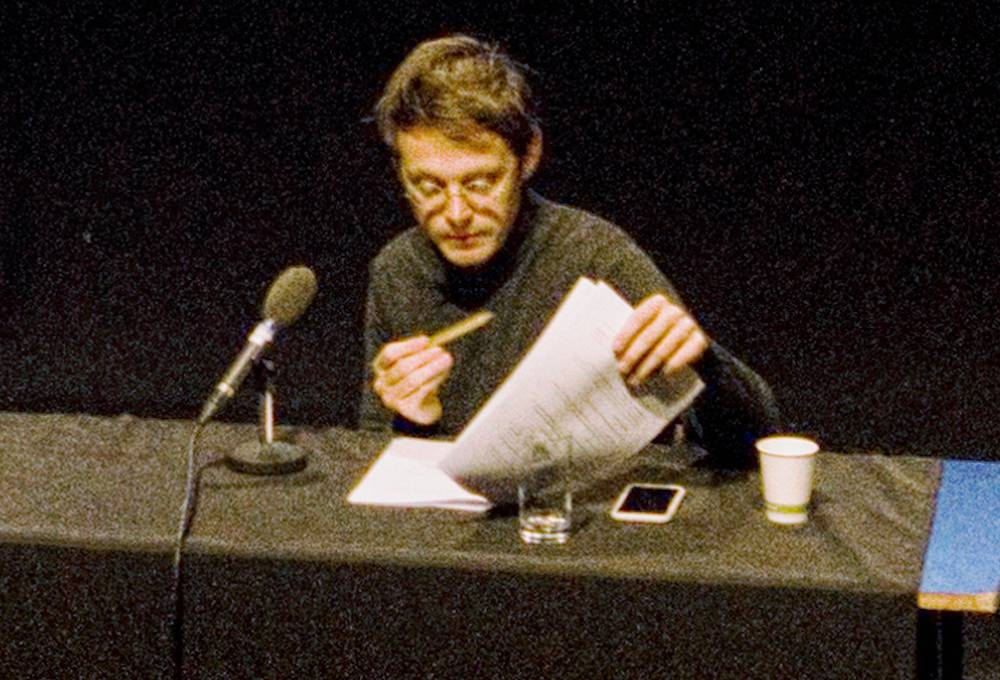Mr Louis Hartnoll

Contact
- Email: louis.hartnoll@kingston.ac.uk
- Location: Penrhyn Road
- Faculty: Kingston School of Art
Research project: Manifest Contradiction: Adorno, Sociology, and the Double Character of Art
Abstract
This thesis reads Theodor W. Adorno's Aesthetic Theory in light of his mature critique of sociological categories. It re-examines one of the book's most debated ‘paratactical parts', the ‘double character of art', via Adorno's confrontation with Émile Durkheim's sociological theory and, more specifically, the concept of the social fact. As such, the thesis consists of a dual investigation into Adorno's critical theory of society and his philosophy of art, organised around four related studies. Chapter One interprets Adorno with and against both Alfred Sohn-Rethel and Gillian Rose, in an exposition of the social content and presuppositions of Immanuel Kant's critical philosophy and against the background of the enduring problem of the Kantianism of sociology. Framed through Adorno and Max Horkheimer's abandoned second book on dialectics, Chapter Two reconsiders Adorno's metacritique of positive negation through the concept of positivity in the writings of G.W.F. Hegel. Complementary to this, Chapter Three reconstructs Durkheim's concept of the social fact within the context of Adorno's post-war confrontation with positive social science, arguing that, for all its faults, Durkheim's concept inadvertently advances the Marxian theory of reification as the theory of the appearance of the thing-like character of social relations. Finally, Chapter Four reinterprets the double character of art through its ‘social side', art as fait social. By drawing on Adorno's critique of sociological categories, this chapter argues that we should understand the concept of the social fact as part of an anti-sociological project. Aesthetic Theory thereby avoids the errors that Durkheim and other sociologists make, whilst nonetheless acknowledging the actuality of the contradictions which produced such errors. On this interpretation, art as social fact denotes Adorno's theory of the manifest contradiction by which social antagonism emerges within the artwork. The thesis concludes with a brief reflection on the possible art-historical application of this theory, arguing, contra the commonplace image of Adorno, that his philosophy of art furnishes us with a novel, generative, and enduring theory of art's social character.
- Research degree: PhD
- Title of project: Manifest Contradiction: Adorno, Sociology, and the Double Character of Art
- Research supervisor: Professor Peter Osborne
- Other research supervisor: Professor Howard Caygill
Biography
Alongside my doctoral research, I work as an Associate Editor for the Historical Materialism journal and an Adjunct Lecturer at the Hochschule für Bildende Künste Braunschweig. Prior to this, during the 2020–21 academic year, I served as Gastwissenschaftler [Visiting Researcher] at the Institut für Sozialforschung, Goethe-Universität Frankfurt am Main, supervised by Prof. Juliane Rebentisch. I have also taught at Central Saint Martins, University of the Arts London, at the Goethe-Universität Frankfurt am Main, and Columbia University and have given talks at various art institutions such as the BALTIC, Arnolfini Gallery, Whitechapel Gallery, and Tate Britain. I was previously an Editor at the Afterall Research Centre where I assisted with the One Work, Exhibition Histories, and Critical Reader series.
Areas of research interest
- Theodor W. Adorno
- Frankfurt School
- Critical theory
- G.W.F. Hegel
- Gillian Rose
- Karl Marx
- Heterodox Marxism
- Contemporary art theory
- Social philosophy
- Art and society
Qualifications
- MA Aesthetics and Art Theory, CRMEP, Kingston University London
- MA Contemporary Art Theory, Goldsmiths College, University of London
- BA(Hons) Advertising, London College of Communication, University of the Arts London
Funding or awards received
- AHRC–Techne Ph.D. Scholarship (2017)
- CRMEP Aesthetics and Art Theory Dissertation Prize (2017)
- CRMEP Postgraduate Scholarship (2015)
- Socrates–Erasmus Postgraduate Scholarship (2012)
Publications
2021, ‘As a Rule, the Bird Swallows the Fly: Kracauer and the Micrological', Siegfried Kracauer Filmreihe, ed. Leonie Hunter and Felix Trautmann, Frankfurt: Institut für Sozialforschung
2021, Managing Editor, Art and Autonomy: A Critical Reader, Sven Lütticken, London: Afterall Books
2020, 'With a Dash of Foolishness: Marxist Personae in Nachrichten aus der ideologische Antike (2008)', Décadrages – Cinéma, à travers champs, no.44–45
2020, Review of 'Harun Farocki, Ich habe genug! Texte 1976–1985', Critique d'art, no.55
2020, ‘Preview of "Aby Warburg: Bilderatlas Mnemosyne – The Original"', Artforum Vol.58, no.5
2019, ‘Seeing Horizontally: Interview with Babette Mangolte', Moving Image Review & Art Journal, vol.8, no.1/2, Special Issue on Chantal Akerman
2018, ‘Without Further Ado: Review of Theodor W. Adorno, Aesthetics', Radical Philosophy, 2.03.
2016, ‘Artists at Work: Interview with Simone Forti', Afterall Online
2015, Co-Editor, Bad Feelings, London: Book Works.
Conference papers
2021, ‘A Peculiar Unfreedom: Reconstructing Adorno's Theory of the Artist', Centre Marc Bloch, Berlin
2021, ‘Against a Sharp White Background: Fanon at the ICA', BALTIC Centre for Contemporary Art, Gateshead
2020, ‘Classroom Tyrant: Theodor W. Adorno and the Education for Authoritarianism', at 'Pedagogic Relations: Art and Art History', Centre for the Study of Contemporary Art and the Institute for Advanced Studies, University College London
2019, ‘"Trophies of Empire" (1992–93) Archive Study Day', Arnolfini
2019, ‘Into the Margins: Reading Walter Benjamin and Carl Linfert', 2019 Istanbul–Oldenburg Critical Theory Conference, Carl von Ossietzky Universität Oldenburg
2019, ‘Exhibition Histories Talk: Charles Gaines', Whitechapel Gallery
2018, ‘Exhibition Histories Talk: David A. Bailey', Whitechapel Gallery
2016, 'Hegel and Arts Historical Exceptionalism', Society for European Philosophy–Forum for European Philosophy Annual Conference, Regent's University, London
